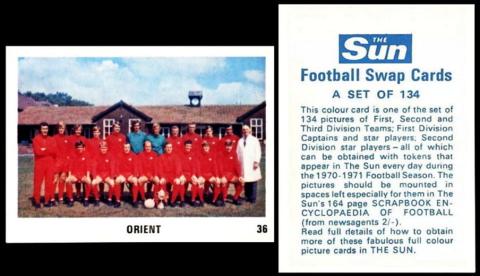
The clue here was "The Sun" because heat is a vital part of turning the things you put into the compost bin into usable compost. And putting the compost in the sun for most of the day gets you heat for free. Though you can buy special hot composters that run at up to sixty degree temperatures and say they can make compost in under a month, rather than the six to twelve that a normal compost pile takes. Adding heat to natural materials breaks down the structure and lets it rot more easily, and, more importantly, kills weeds and infections - but you can speed any type of composting up by making sure you cut everything up into small inch sized pieces, and this is also a good way of telling what should go into the compost, because bad things like branches that will not rot down will not cut up either.
Now this card says simply "Orient" but it actually shows Leyton Orient, who are based in the Waltham Forest area, East of London. The clock tower in the photo was how I tracked them down.
They were. like many teams, founded as a cricket club who used football to keep fit out of the cricket season. The cricket club started in 1881, and the football slowly developed until they joined the Clapton and District Football League in the late 1890s; coincidentally as Orient. They then changed their name to Clapton Orient, just before the turn of the century, a name which they retained for many years - it was only changed to Leyton Orient after the end of the Second World War.
Orient's golden years were in the 1960s and 1970s. In the 1961–62 season Orient were promoted to the top tier of English football, the First Division, for the only time in their history, after finishing second in Division Two under the management of Johnny Carey. The team struggled in the top flight and were relegated after just one season. Nonetheless, they did defeat local rivals West Ham United at home.
The 1970s were kind to them, they started it as League Division Three champions, and moved up to League Division Two, where they would remain for the entire decade. And in 1978 they reached the semi-final of the FA Cup for the first, and so far last, time - losing 3-0 to Arsenal.
This is quite a sought after set, which shows teams and individual players - Captains, Star Players, and Teams from League Division One, Star Players and Teams from League Division Two, and Teams from League Division Three. The backs were in various colours, only one tone of colour per back.
They appear in our original British Trade Index part III as :
The Sun
Newspaper. Cards issued in the 1970s.
Football Swap Cards. 69 x 51. Nd. (134). Album issued, titled "Encyclopaedia of Football, 1971"
They are slightly borderline as them being trade cards, because they were not inserted in the paper, you had to collect tokens from each edition of the newspaper, save them up, and then send them to the address given, and then you would get your cards in exchange through the post. The album was available at newsagents, for a cost of two shillings, but it is slightly incorrectly described in the British Trade Index above - it was actually called "The Sun Scrapbook Encyclopaedia of Football", and it was very comprehensive, having 134 pages, these including histories of the clubs, maps of the ground, and spaces for the cards to act as pictures.
This is partially corrected by our updated British Trade Index, which reads :
Football Swap Cards. 1970-71. 69 x 51. Nd. (134). Album named "Scrap Book Encyclopaedia of Football, 1971", obtained for cost of post and packing.
This last line suggests that the newsagent was not the only way to get an album, and that you could send up to the Sun for one.
The problem with this set was that the cards were not adhesive, which basically meant that every kind of glue was used to stick them in, most of them quite unsuitable to the task, and this is why the cards are not so easy to come by, let alone in collectable condition. Another reason for their scarcity may be that in advertising of the time The Sun broadcast that you could swap your completed album for a football - if you were really quick, because the football was only available for the first 100 albums sent in.
